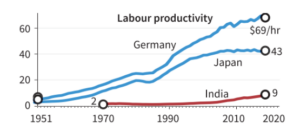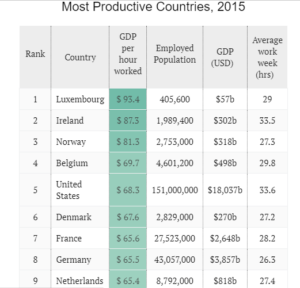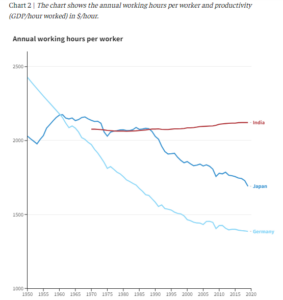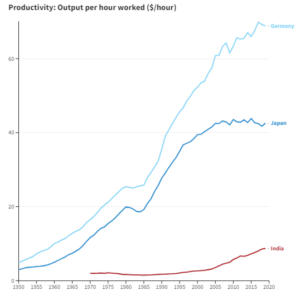ForumIAS announcing GS Foundation Program for UPSC CSE 2025-26 from 19 April. Click Here for more information.
Contents
- 1 Introduction
- 2 What is Productivity and what are its types?
- 3 What is the status of India’s labour productivity and working hours ?
- 4 What are the arguments in favour of ’70 hours work week’?
- 5 What are the Arguments against the ’70 hours work week’?
- 6 What should be the way forward for Increasing productivity without increasing the work hours?
- 7 Conclusion
| For 7PM Editorial Archives click HERE → |
Introduction
Recently, Infosys Founder Narayan Murthy suggested ‘70 hours work week‘ to improve India’s labour productivity and competitiveness. He emphasised the need to improve India’s labour productivity, citing Germany and Japan as examples. This idea of long working hours as a measure to improve the country’s work productivity has drawn both support and criticism.
What is Productivity and what are its types?
Productivity- Productivity measures how efficiently inputs like labour and capital are used to produce outputs such as goods and services.
Types of Productivity
| Labour/Work Productivity | (1) Measures the output produced per hour of work. For ex- for a GDP of $1 trillion with its people working 20 billion hours, the labour productivity is $50 per hour. (2)It is directly linked to increased wages, better living standards, and consumer’s purchasing power. |
| Capital Productivity | (1) Measures the output produced by using physical assets like machinery, buildings and equipments. (2) It indicates how efficiently investments in physical assets are used, impacting profitability and competitiveness. |
| Total Factor Productivity | (1) Measures the output produced by advancements in innovation and technology. (2) It reflects efficiency improvements, technological progress, and innovation in an economy. |
What is the status of India’s labour productivity and working hours ?
Indian Labour productivity status as per the ILO Data
| India | India’s hourly output stands at $8.47. Indians work an average of nearly 48 hours per week. |
| France | France’s hourly output stands at $58. Average workweek is around 30 hours per week. |
Young India’s working hours
(1) Time Use Survey in India 2019 data shows that young Indians aged 15-29 currently work around 7.2 hours a day in rural areas and 8.5 hours a day in urban areas.
(2) A State-wise comparison of the time spent on work in urban areas is higher than in rural areas. Uttarakhand ranks first, with young people from the State working for an average of 9.6 hours a day.
Mr. Murthy’s rationale for long working hours taking the productivity increase of Japan and Germany by long working hours
Germany and Japan after the second world war encouraged their workforce to put in extra hours of work per day to boost the economic productivity. The average working hours was between 2,200 to 2,400 hours per year, which came down to 8.3 to 9 hours of work per day, adhering to a five-day work week without holidays.
However, 70 hours work week would translate to 14 hours per weekday. This would be even more than what Japan and Germany reached in the post world war era.
What are the arguments in favour of ’70 hours work week’?
1. Increased Productivity- Advocates argue that a longer workweek could potentially result in higher productivity due to more time spent on tasks and projects. Ex- Japan and Germany productivity push due to longer working hours.

2. Higher Economic Growth- It might boost economic growth as more work hours could contribute to increased production and innovation. It can help India reach the goal of $5 trillion economy.
3. Increased Global Competitiveness- In a globalized world, longer work hours might help Indian professionals remain competitive in the international job market. Ex- Financial Sector in India can match the global standards which work round the clock.
4. Potential for higher tax revenues for the government- Increased economic activity and higher incomes due to longer working hours result in greater tax revenues. This can be used for public services and infrastructure development.
5. Opportunity for Skill Development- Individuals can achieve mastery in one’s chosen field by investing extra number of hours at work. For Ex- Out of the 70 hours, one can assign 40 hours to his/her professional responsibilities and set aside 30 hours for personal skill enhancement.
6. Leveraging the Demographic Dividend for Nation Building- India needs a dedicated labour force where young individuals are willing to put in 70 hours of work per week for the service of nation-building.
What are the Arguments against the ’70 hours work week’?
1. Decline in productivity with Long Working Hours- Research shows that productivity declines significantly after 50 hours of work per week and drops further after 55 hours. Germany and Japan further increased productivity by reducing working hours to 1,400-1,600 hours a year.
Ex- World’s most productive countries have the least work week days.

2. Burnout and Mental Health- Workers who put in 70 hours a week are more prone to experience burnout, higher levels of stress and mental health problems. Extended work hours may negatively impact an individual’s health and work-life equilibrium.
3. Increased healthcare costs due to stress-related issues- Longer hours can result in higher healthcare costs, as stress-related health problems become more prevalent.
4. Negative Effect on Family Life- Long work hours can make it more difficult to meet personal and family obligations, strain relationships within the family and disturb the work-life balance.
5. Diminished Creativity and Innovation- Overworked People frequently exhibit less creativity and innovation. Tiredness can hinder one’s capacity for original thought and problem-solving.
6. Work Quality- Longer hours do not always translate into better work. Tired employees are more prone to make mistakes and do subpar work.
7. Exacerbation of gender Inequalities- Extended work hours may have a disproportionate impact on women, who often shoulder greater caring and home obligations, hence exacerbating gender inequalities.
8. Danger of Exploitation- Employers may take advantage of a culture of extended work hours, which could result in unpaid overtime, subpar working conditions, and abuses of workers’ rights.
9. Negative Impact on the Community and Society- Long work hours can reduce participation in the community and society, which can have a negative impact on volunteering work and social cohesiveness.
| Read More- On Labour Productivity in India- NRN Gets It Wrong |
What should be the way forward for Increasing productivity without increasing the work hours?
1. Technological Adoption- We must Invest in modern technologies and automation to streamline processes and improve productivity.
2. Skills Enhancement- Skill India Mission must be implemented properly to provide skill training and education to workers.
3. Upgradation of Infrastructure- We must develop better transportation infrastructure to reduce commuting time and increase accessibility to workplaces.
4. Fostering Innovation- We must encourage research and development (R&D) activities to drive innovation, leading to improved products and services and increased productivity.
Conclusion
Finally, while N.R. Narayana Murthy’s proposal for a 70-hour workweek for young Indians aims to increase productivity, it should be carefully evaluated in light of the potential negative effects on work quality, burnout, mental health problems, and work-life balance. Writing good employment rules requires striking a balance between the needs of the job and the welfare and personal development of the employee.
| Read More- The Times of India UPSC Syllabus Topic: GS Paper 3 Indian Economy – Employment and labour productivity. |






